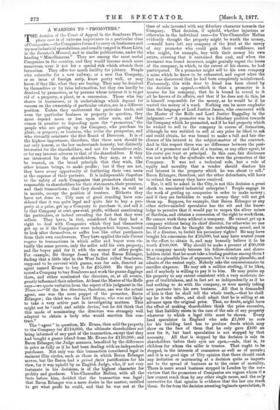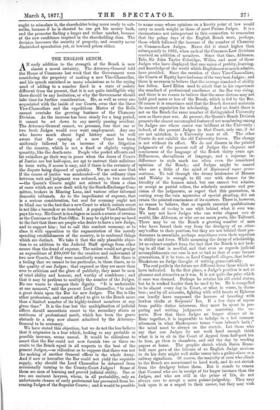A WARNING TO "PROMOTERS."
THE decision of the Court of Appeal in the Sombrero Phos- phate case is of extreme importance to a particular class of Companies,—the Companies formed to carry on businesses and try new industrial speculations, and usually ranged in Share Lists, in the investor's Manual, and in similar publications, under the heading "Miscellaneous." They are among the most useful Companies in the country, and they would become much more numerous, were it not for a special risk which attends their formation. They offer too much facility for jobbery. People who subscribe for a new railway, or a new Gas Company, or an issue of foreign scrip, know pretty well, or may know, if they like, what they are buying. They may be deceived by themselves or by false information, but they can hardly be deceived by promoters, or by persons whose interest it is to get rid of a property, a plant, or a concession. Those who buy shares in businesses, or in undertakings which depend for success on the ownership of particular estates, are in a different position. Unless they understand the particular trade, and even the particular business or property in question, they must depend more or less upon other men, and that comes in practice to depending upon the "promoters," the people who are getting up the Company, who purchase its plant, or property, or business, who revise the prospectus, and who virtually nominate the first Board of Directors. It is of the highest importance, therefore, that these men should be not only honest, as the law understands honesty, but distinctly interested for the shareholders, and not for themselves only, or for any interest adverse to that of the shareholders. If they are interested for the shareholders, they may, as a rule, be trusted, on the broad principle that they wish, like other human beings, to make profits ; but if they are not, they have every opportunity of feathering their own nests at the expense of their partners. It is indispensable therefore to the safety of such Companies that promoters should be responsible to shareholders for their statements, their promises, and their transactions ; that they should in law, as well as in morals, occupy the position of trustees. Hitherto they have not done so. City men of good standing have con- sidered that it was quite legal and quite fair to buy a pro- perty at a price, get up a Company to purchase it, and sell it to that Company at cent.-per-cent. profit, without mentioning the particulars, or indeed revealing the fact that they were sellers. They have, in fact, considered that they had a right to deal with Companies which they had themselves got up as if the Companies were independent buyers, bound to look after themselves, or suffer loss like other purchasers from their own carelessness. They have applied the rule Caveat ernptor to transactions in which seller and buyer were vir- tually the same person, only the seller sold his own property, and the buyer paid for it with the money of other people. For example, Sir George Sessel says that Baron Erlanger, finding that a little islet in the West Indies called Sombrero, supposed to be covered with guano, was for sale, directed an agent named Evans to buy it for £55,000. He then pro- moted a Company to buy Sombrero and work the guano diggings there, and either nominated the directors, or, at all events, greatly influenced their selection. At least the Master of the Rolls says—we quote verbatim from the report of his judgment in the Times :—" Of the five directors, therefore, one was the actual agent, one was the mere puppet of the promoter, Baron Erlanger; the third was the Lord Mayor, who was not likely to take a very active part in investigating matters. This might not be craft and subtle device,' but he did think that this mode of nominating the directors was strangely well adapted to obtain a body who would sanction this con- tract."
The "agent" in question, Mr. Evans, then sold the property to the Company for £110,000, the ultimate shareholders not being informed of any part of the transastion, except that they had bought a guano island from Mr. Evans for £110,000; and Baron Erlanger, the Judge assumes, benefited by the difference in price as fully as if he had been dealing with an independent purchaser. Not only was this transaction considered legal in eminent City circles, such as those in which Baron Erlanger moves, but the Baron had a prirnd facie justification for his view, for it was upheld by an English Judge, who, if not very fortunate in his decisions, is of the highest character for probity and goodness. Vice-Chancellor Maims, with all the facts before him, decided that the transaction was legal ; that Baron Erlanger was a mere dealer in the matter, entitled to get what profit he could, and that he was not at the time of sale invested with any fiduciary character towards the Company. That decision' if upheld, whether injurious or otherwise in the individual case—for Vice-Chancellor Malins evidently thought the property might be worth the money, —would have left any company of the kind at the mercy of any promoter who could gain their confidence, and who might, for example, buy with their money his own estate, averring that it contained fine coal, and when the averment was found incorrect, might genially regret the losses of the company, in which, to the extent of his shares, he had participated. Or a promoter might sell to his own company a mine which he knew to be exhausted, and regret when the fact was discovered that he had been completely misinformed. Fortunately, this wide door to fraud has been closed by the decision in appeal,—which is that a promoter is a trustee for his company, that he is bound to reveal to it all he knows of its affairs, and that if he does not do this, he is himself responsible for the money, as he would be if he wasted the money of a ward. Nothing can be more emphatic than the language of Lord Justice James, who concurred with the Master of the Rolls and Lord Justice Baggallay in the judgment :—" A promoter was in a fiduciary position towards the Company which he promoted, and if he had property which he wished to sell to the company in course of formation, although he was entitled to sell at any price he liked to ask and could obtain, he was bound to make a full and fair dis- closure of his interest in the subject-matter of the contract. And in this respect there was no difference between the posi- tion of a promoter and that of a trustee, or any other agent, to his cestui que trust or principal. In this case, fair disclosure was not made by the syndicate who were the promoters of the Company. It was not a technical rule, but a rule of equity and morality that a vendor should disclose his real interest in the property which he was about to sell." Baron Erlanger, therefore, and the other defendants, will have to refund the money they have received.
But, it will be asked in the City, is not this decision a great check to associated industrial enterprise ? People engage in the work of getting up companies in order to make money; and if they are forbidden to make money they will not get them up. Suppose, for example, that Baron Erlanger or any other active-minded speculator has the wit and the know- ledge to perceive that it would pay to reopen the silver mines of Sardinia, and obtains a concession of the right to work them. He cannot work them without a company. He cannot get up a company without being its chief director, for otherwise no one would believe that he thought the undertaking sound, and is he, if a director, to forfeit his pecuniary rights? He may have bought his concession for £10,000, but may have wasted years in the effort to obtain it, and may honestly believe it to be worth £100,000. Why should be make a present of £90,000 to a company merely because his fellow-directors and share- holders insist that he must take a leading position among them? That is a plausible line of argument, but it is only plausible, and admits of the easiest reply. Nobody asks the concessionnaire to sacrifice sixpence. He may ask a million sterling, if he likes, and if anybody is willing to pay it to him. He may praise up his property to any extent consistent with a very moderate de- gree of truthfulness, and in fact act as independently as if he had nothing to do with the company, or were merely taking new partners into his own business. All that is demanded of him is that he shall tell the whole truth,—that he shall say he is the seller, and shall admit that he is selling at an advance upon the original price. That, no doubt, might have the effect of making shareholders think the prim excessive, but that liability exists in the case of the sale of any property whatever to which a legal title must be shown. Every land speculator in England who asks £1,000 an acre for his building land has to produce deeds which may show on the face of them that he only gave £100 an acre for it, but land speculation is not stopped by that necessity. All that is stopped by the decision is sale to shareholders before their eyes are open,—sale, that is, to children for whom the seller is trustee. That ought to be stopped, in the interests of commerce as well as of morals ; and it is no good sign of City opinion that there should exist any irritation or murmuring at a decision quite as import- ant to the spread of business as to the cause of morality. There is more sound business stopped in London by the con- viction that the promoters of Companies are rogues whom tie law cannot reach than by any other single cause, and the only corrective for that opinion is evidence that the law can reach them. So far from the decision arresting legimate speculation, it
ought to stimulate it, the shareholder being more ready to sub- scribe, because if he is cheated he can get his money back, and the promoter finding a larger and richer market, because of the new confidence inspired in the shareholding class. The decision increases the security of property, and security never diminished speculation yet, or lowered prices either.



































 Previous page
Previous page